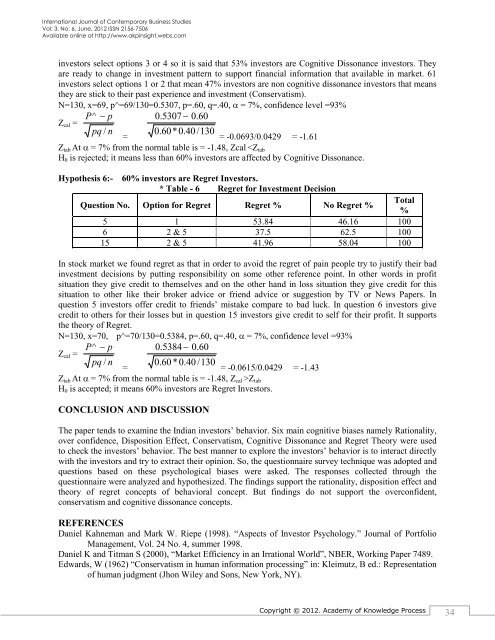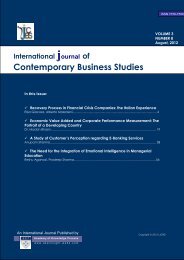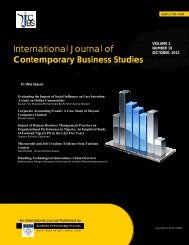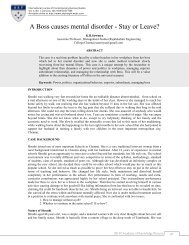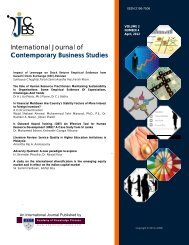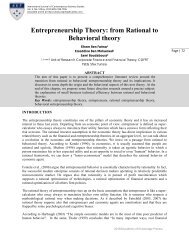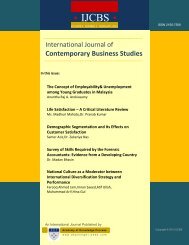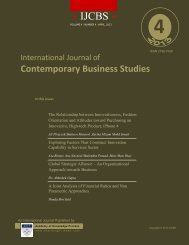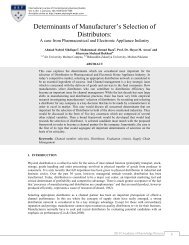International journal of Contemporary Business Studies
International journal of Contemporary Business Studies
International journal of Contemporary Business Studies
You also want an ePaper? Increase the reach of your titles
YUMPU automatically turns print PDFs into web optimized ePapers that Google loves.
<strong>International</strong> Journal <strong>of</strong> <strong>Contemporary</strong> <strong>Business</strong> <strong>Studies</strong><br />
Vol: 3, No: 6. June, 2012 ISSN 2156-7506<br />
Available online at http://www.akpinsight.webs.com<br />
investors select options 3 or 4 so it is said that 53% investors are Cognitive Dissonance investors. They<br />
are ready to change in investment pattern to support financial information that available in market. 61<br />
investors select options 1 or 2 that mean 47% investors are non cognitive dissonance investors that means<br />
they are stick to their past experience and investment (Conservatism).<br />
N=130, x=69, p^=69/130=0.5307, p=.60, q=.40, = 7%, confidence level =93%<br />
P^ p 0.5307<br />
0.60<br />
Z cal =<br />
pq / n 0.60*0.40 /130<br />
=<br />
= -0.0693/0.0429 = -1.61<br />
Z tab At = 7% from the normal table is = -1.48, Zcal Z tab<br />
H 0 is accepted; it means 60% investors are Regret Investors.<br />
CONCLUSION AND DISCUSSION<br />
The paper tends to examine the Indian investors‟ behavior. Six main cognitive biases namely Rationality,<br />
over confidence, Disposition Effect, Conservatism, Cognitive Dissonance and Regret Theory were used<br />
to check the investors‟ behavior. The best manner to explore the investors‟ behavior is to interact directly<br />
with the investors and try to extract their opinion. So, the questionnaire survey technique was adopted and<br />
questions based on these psychological biases were asked. The responses collected through the<br />
questionnaire were analyzed and hypothesized. The findings support the rationality, disposition effect and<br />
theory <strong>of</strong> regret concepts <strong>of</strong> behavioral concept. But findings do not support the overconfident,<br />
conservatism and cognitive dissonance concepts.<br />
REFERENCES<br />
Daniel Kahneman and Mark W. Riepe (1998). “Aspects <strong>of</strong> Investor Psychology.” Journal <strong>of</strong> Portfolio<br />
Management, Vol. 24 No. 4, summer 1998.<br />
Daniel K and Titman S (2000), “Market Efficiency in an Irrational World”, NBER, Working Paper 7489.<br />
Edwards, W (1962) “Conservatism in human information processing” in: Kleimutz, B ed.: Representation<br />
<strong>of</strong> human judgment (Jhon Wiley and Sons, New York, NY).<br />
Copyright © 2012. Academy <strong>of</strong> Knowledge Process<br />
34


